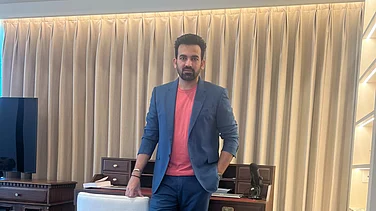Optimistic theorists count upon sport as a bond between nations. In the present state of nationalistic feeling, it is only another cause of international misunderstanding. The battles waged on the football field and the race track aremerely preliminaries to, and even contributory causes of, more serious contests.
-Aldous Huxley
HUXLEY wrote these words in 1939, on the eve of World War II, but they apply with equal force to a cricket match played a little over a year ago. India versus Pakistan, Bangalore, March '96, the Wills World Cup quarterfinal. The homeside, batting first, scored 287 for 6, every run accompanied by 50,000 loud-throated cheers and plenty else besides. In Pakistan's reply, however, the marvellous strokeplay of Sohail and Anwar was met with a silence that was total anddeafening. After wickets fell in a heap the crowd bestirred itself, to be silenced once more by a battling Javed Miandad. When he too was out, and the match lost and won, I stood up to applaud the veteran, leaving the cricket field for the lasttime. "What are you clapping him for?" yelled a man behind me. Through a long evening I had stood the crowd's shameful partisanship; now I responded: "You should clap him too. He is a truly great player and we shall never see him again." The short, definitive reply: "Thank God I'll never see the bastard again."
As Anwar and Sohail blazed away, the restaurants on M.G. Road, running along Chinnaswamy stadium, downed shutters--a judicious move, for if India had lost there would have been destruction of property and, possibly, life. A cricketmatch had become the vehicle of unreserved hatred of Pakistan, and Pakistanis, part of the 'unfinished business of Partition'. Not just in Bangalore, through the '96 Cup Indian crowds chanted 'Pakistan Hai Hai'. Even at 'neutral' venues, as in theWest Indies-Australia match at Jaipur.
Had it always been so? I thought back to the late '78 series. India and Pakistan hadn't played each other for 17 years (two wars intervening) and interest was keen. Moreover, the matches, played in Pakistan, were the first to be telecast livenationwide. In my college common room we fought to be up close, better to taste the fruit forbidden us so long--the grace and artistry of Majid Khan and Zaheer Abbas, the pace of Imran, the swing of Sarfraz Nawaz. Although India lost twoTests and drew one, we could frankly and openly admire the opposition's skills, even, it must be said, those of the young Miandad. There were no conspiracy theories abroad, no malicious scapegoating. When the defeated cricketers came back, they moved freely in their mohallas (now they would have to call for armed protection).
Sport mirrors social conflict, in many ways in fact contributes to it. Between '77 and '97 Indo-Pak ties have steadily deteriorated. Optimistic theorists think these can be set right by a cricket carnival or two. The evidence suggests otherwise.Post-Kashmir post-Ayodhya, in times of Coca-Cola nationalism, the expectations we place in our cricketers are absurdly inflated. Owing solely to a certain facility with bat or ball, boys are asked to stand in for the nation, to make up for its failureto match the Asian Tigers. Winners get treated with exaggerated deference, losers are spat upon, more so if they've lost to Pakistan.
I think it more than likely that sporting encounters between India and Pakistan create or consolidate Hindu-Muslim antagonisms in India. Politics and culture have already, goodness knows, kept the two great communities more apart than isgood for either. I recall a seminar where distinguished Kannada writer U.R. nanthamurthy confessed it was extraordinarily difficult for him to portray a Muslim character in his novels, for he could not so easily draw upon personal experience.Speaking next, I boasted that in plotting my tales I had no such problem, for where would Indian cricket be without the Pataudis, Salim Durrani and Abid All, Ghulam Ahmed and Abbas Ali Baig, Azharuddin and Kirmani--men who've broughtgreat lustre to our cricket? But it's also (tragically) the Indian cricketer who happens to be a Muslim who bears, when playing Pakistan, the most unfair burden of all.
The marriage of sport and nationalism is made more poisonous by one-day cricket, night cricket in particular. The player under floodlights, becomes gladiator and spectators thirsty Romans. With corporate sponsorship and block-booking, thegenuine cricket lover has been displaced by the overworked, overpaid, half-drunk, hyper-nationalist yuppie. This fellow doesn't understand the game, and comes only to see his side win. He is quick to praise and quicker to blame. A temperament to match the sport, for the limited overs game punishes players heavily; no second innings for the batsman, no spare spells for the bowler.
Test cricket, by contrast, allows freer play to the skills of the player. Its rhythms also allow for mistakes to be less than catastrophic, and to be redeemed in the next inning or match; Tests between India and Pakistan might safely be played in thesubcontinent; for one thing, they would bring back to the ground those who know and love the game. But pyjama matches I would outlaw; if the 'advertisers persist I would offer them as venue not Sharjah, not even Canada, but a choice betweenAntarctica and the Moon.
(The writer's books include 'Wickets in the East' and 'Spin and Other Turns')


















